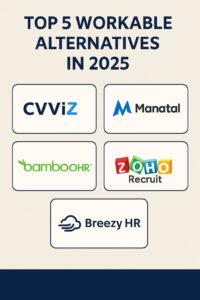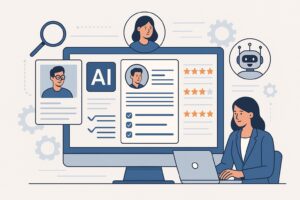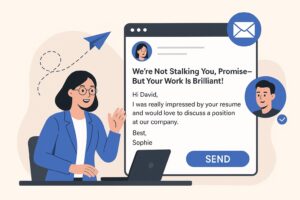Once there was a recruiter, let’s call her Ananya. After having a full weekend rest, she came bright and fresh on Monday morning to see over 200 resumes waiting to be skimmed. By lunchtime, she barely managed to go through 40 of them, her eyes aching, her stomach rumbling, her enthusiasm drained, and her hope to find the right candidate by the end of the day almost vanishing. She knows the right candidate is there, but she doesn’t have the energy to look.
Now, let’s imagine this. Ananya came bright and fresh to the office and uploaded all the resumes to her recruitment software. The AI worked out its magic, and while she slowly sipped her coffee, crafting a perfect mail draft in her mind to woo the candidates, the software provided her a list of 10 candidates, neatly laying down their strengths and weaknesses, and also how likely they are to fit in the company’s culture on a scale of 1 to 10.
In a world where the difference between a failed and a successful product could be the ability to hire the right talent, companies can’t afford to let slow processes, unconscious bias, or plain old recruiter fatigue get in the way of hiring the top candidates.
AI-driven recruitment tools automate the mundane tasks, helping recruiters find the best-fit candidates, all the while giving them room to do what humans do best: connect, engage, and build relationships.
But here’s the catch—not all AI recruiting software is created equal. Some promise magic but deliver chaos, while others truly transform the way hiring happens. The true challenge lies in figuring out what to look for—and what to avoid—when choosing the right solution.
This blog breaks everything down for you: the must-have features to look out for in a recruitment software, the red flags to steer clear of, and a peek into the future of AI-powered hiring.
Why AI Recruitment Software Is A Must In 2025
Before you start hunting for the best AI recruitment software out there, let’s first understand why you even need one for your recruitment team.
Recruitment in 2025 can not solely rely on the “post job → pray for applicants” strategy. Today? That’s the sure-shot way to lose top talent to competitors who might be running their hiring like Formula 1 pit crews—quick, precise, and armed with technology.
Recruitment has drastically evolved over the past 5 years. Job seekers now expect personalized communication, lightning-fast updates, and hiring decisions that don’t drag on for months. At the same time, organizations are under pressure to deliver candidates quickly, reduce turnover, and prove that their hiring processes are fair and bias-free.
And let’s be real!
Juggling all of this manually is like trying to play Jenga on a rollercoaster—it doesn’t end well.
So, how can AI Recruitment Software help you find the top candidates with your team’s sanity intact?
- Lightening-fast resume screening to help you find the potential candidates in a matter of hours.
- Unconscious Bias Gets Minimised as data points become supreme. This helps level the playing field for the candidates.
- Candidate Experience Improves Dramatically as AI can help companies be available 24*7, providing candidates instant updates, personalised communication, and keeping them engaged in the waiting period.
- Predictive Hiring Analytics is helping recruiters make smart data-backed decisions, forecasting which candidates are most likely to succeed long-term.
Recruiters spend almost 40% of their time just screening resumes, and AI tools can cut that down by 70–75%. That’s not just saved hours—it’s saved sanity with improved output. In other words, a win-win.
What To Look For And What To Avoid In AI Recruitment Software?
Choosing AI recruiting software is a lot like finding the right life partner. There are going to be a lot of flashy personality traits, but what you would want to settle for would be plain and simple qualities with a rock-solid foundation. To avoid regret later, these are some of the features that you need to look for:
1. Advanced Resume Screening
An average job posting attracts almost 200+ applications. It is not humanly possible to skim through so many applications and not miss out.
A good AI recruitment tool uses Natural Language Processing (NLP) to understand resumes beyond keywords. Instead of thinking “Java = good, Python = bad,” the system looks at context. It looks for whether the candidate used Java in projects, or is just used as an acquired skill.
In today’s fast-paced recruitment landscape, where companies can’t afford to hire slowly, contextual AI matching ensures resumes are ranked based on relevance and experience. This helps companies find the relevant candidates who are more likely to join and stay in a company for a long time.
Avoid: keyword-only matching systems.
Look for: contextual AI-matching
2. Bias-Free Hiring Capabilities
This unconscious bias can be easily eliminated using good AI recruiting software. It anonymizes resumes—removing names, ages, genders, and even colleges. Thus AI helps you reduce hiring bias. This helps keep the focus of the interview team on skills and experience.
Avoid: tools with black-box AI that don’t explain how decisions are made.
Look for: blind hiring features, clear explainability, and transparency.
3. Seamless Integration
Recruiters already have a lot on their plates. They need a system that takes the load off them. A good recruitment tool needs to blend as smoothly as it always belonged to your recruitment system.
Avoid: siloed systems that refuse to integrate with your existing stack.
Look for: integrations with ATS platforms, LinkedIn, Gmail/Outlook, and job boards.
4. Candidate Experience
In 2025, ghosting candidates isn’t just rude—it’s brand suicide. If you are not readily available to your candidates, some of the company will be, and you can’t afford that.
A good AI recruiting software helps you engage candidates. Features like instant Chatbot replies, automated updates, and personalized communication make applicants feel seen, not forgotten. Thus AI AI-driven communication helps you improve the candidate experience.
Avoid: clunky portals with complicated interfaces.
Look for: chatbots, personalized outreach, and simple, mobile-friendly application processes.
5. Recruitment Analytics And Insights
If you can’t measure it, you can’t improve it. The right AI software provides analytics on important recruitment metrics like:
- Time-to-hire
- Source effectiveness (job boards vs referrals)
- Cost-per-hire
- Candidate drop-off points
If the tool provides predictive insights, that is even better, as they can help you forecast which candidates are more likely to stay and succeed.
Avoid: platforms that drown you in raw data without action steps.
Look for: tools that provide recruiter-friendly and decision-oriented dashboards.
6. Scalability and Customisation
You may be hiring 5 people today, but you might need to hire 500 the next year. Your AI recruitment should be able to help you in both scenarios. Startups need flexibility, enterprises need robustness—and everyone needs custom workflows.
Avoid: rigid tools.
Look for: customizable workflows, templates, and the ability to handle volume without crashing.
7. Security and Compliance
Companies have to handle sensitive candidate data. They mess this up, and they’re not just facing angry applicants— they are facing legal trouble.
A good AI recruitment tool provides foolproof security and compliance information.
Avoid: vendors with vague data policies or no mention of compliance.
Look for: GDPR, EEOC compliance, audit logs, and secure storage.
The best AI recruiting software isn’t the one with the flashiest dashboard—it’s the one that quietly saves you hours, supports fair hiring, delights candidates, integrates smoothly, and keeps you compliant.

The Future Of AI Recruiting Software
Recruitment is evolving faster than you can say, “We need to fill this position.” AI-powered resume screening, predictive analytics, and chatbot interviews are no longer a mere vision. They have become standard recruitment practice in 2025.
So, what’s next?
1. Predictive Hiring
AI is not able to analyze data faster than you can finish your coffee. And no, we are not referring to shortlisting the best candidates based on the requirements you have listed. AI tools can now tell you who’s likely to stay, thrive, and grow in your company culture. Imagine being able to predict employee retention rates before sending an offer letter. That’s where recruiting software is slowly heading.
2. Hyper-Personalized Candidate Journey
Generic emails saying “We’ve received your application” are on their way out. Future AI tools will be able to craft personalized communication for each candidate—tailored updates, role-specific content, even career-path suggestions. Think of it as Netflix recommendations, but for your career.
3. Skills-Based Hiring
With the gig economy and non-linear careers becoming the norm, job titles will matter less than skills. AI will help companies dig deep into transferable skills, helping them spot “hidden gems” who don’t tick the traditional boxes but have the right capabilities.
4. Ethical & Transparent AI
As regulations tighten, companies will start looking for AI that’s explainable, bias-free, and compliant with laws like GDPR and EEOC. Black-box decision-making won’t cut it; recruiters and candidates alike will expect accountability.
5. The Recruiter’s New Role
Can AI replace recruiters? Never.
If anything, it’ll make them more strategic. Recruiters will spend less time buried in spreadsheets and more time on what humans do best—building trust, negotiating offers, and nurturing relationships.
The bottom line? AI will continue to reshape recruitment, but the winners will be those who pick software that evolves with them.
Why Investing In AI For Recruitment Is A Smarter Choice?
In today’s competitive job market, recruiting the “old-fashioned way” is like running a marathon in flip-flops: possible, but unnecessarily painful. The smarter organizations are the ones realizing that AI recruiting software isn’t an expense, it’s an investment—one that pays dividends in speed, efficiency, and quality of hires.
Here is how AI in recruitment can provide you with returns that are both short-term and long-term:
1. Faster Hiring Better Returns
In industries where the best candidates are off the market in 10 days or less, slow hiring isn’t just inconvenient—it’s costly. AI-powered tools automate resume screening, shortlist the best-fit profiles, and cut hiring times drastically. This enables recruiters to handle the resumes efficiently and divert more time to actually connecting with top talent, making them feel a part of the company even before you hire them.
2. Reducing Hiring Bias
Unconscious bias used to be an unavoidable hassle in recruitment. AI has revolutionised the whole recruitment landscape by eliminating it to a large extent by anonymizing resumes. This ensures that the prime focus is on skills. This helps level the playing field, enabling organizations to build stronger, more diverse teams. In the long run, diversity isn’t just ethical—it’s profitable, boosting innovation and team performance.
3. Optimizing Costs
Every wrong hire costs more than just money to your company. By helping recruiters make smarter, data-driven decisions, AI reduces mis-hires and the costly turnover they bring. The ROI is clear: better hires, lower costs, stronger teams.
4. Enhancing Candidate Experience
A poor hiring experience can damage your employer brand faster than a viral tweet. AI-driven communication tools such as chatbots, personalized updates, and 24*7 availability ensure candidates feel valued throughout the process, reducing drop-offs and improving offer acceptance rates.
5. Future Proofing Recruitment
As work evolves, so will hiring needs. AI-driven systems that learn, adapt, and scale give organizations the flexibility to grow without overburdening recruiters. Whether you’re a startup or an enterprise, investing in AI today ensures you stay ahead tomorrow.
The Bottom Line: Companies that see AI-powered recruitment as an investment in future-proofing talent acquisition will thrive in 2025 and beyond. A good recruitment software can help you take a smarter approach to your recruitment strategy, combining automation, fairness, and actionable insights to make hiring a competitive advantage, not a bottleneck.
AI Recruiting Software Is A Necessity In 2025 And Beyond
In today’s fast-paced job market, with shorter candidate lifecycles and rising expectations, relying on outdated processes is a recipe for missed opportunities.
That’s why AI recruiting software isn’t just a “nice-to-have” anymore—it’s a necessity. The right tool helps recruiters cut down hours of manual screening, minimize unconscious bias, deliver better candidate experiences, and make smarter hiring decisions backed by data. Just as importantly, it ensures your hiring strategy is agile and future-ready.
Of course, not all AI tools are created equal. Some overpromise and underdeliver, some prioritize dashboards over real outcomes, and some fail to balance automation with the human touch. The real winners are the platforms that combine intelligence, transparency, and user-friendliness—because hiring may be powered by AI, but people still drive it.
Whether you’re a startup chasing your first hires or an enterprise scaling teams globally, AI can help you hire faster, fairer, and smarter.




